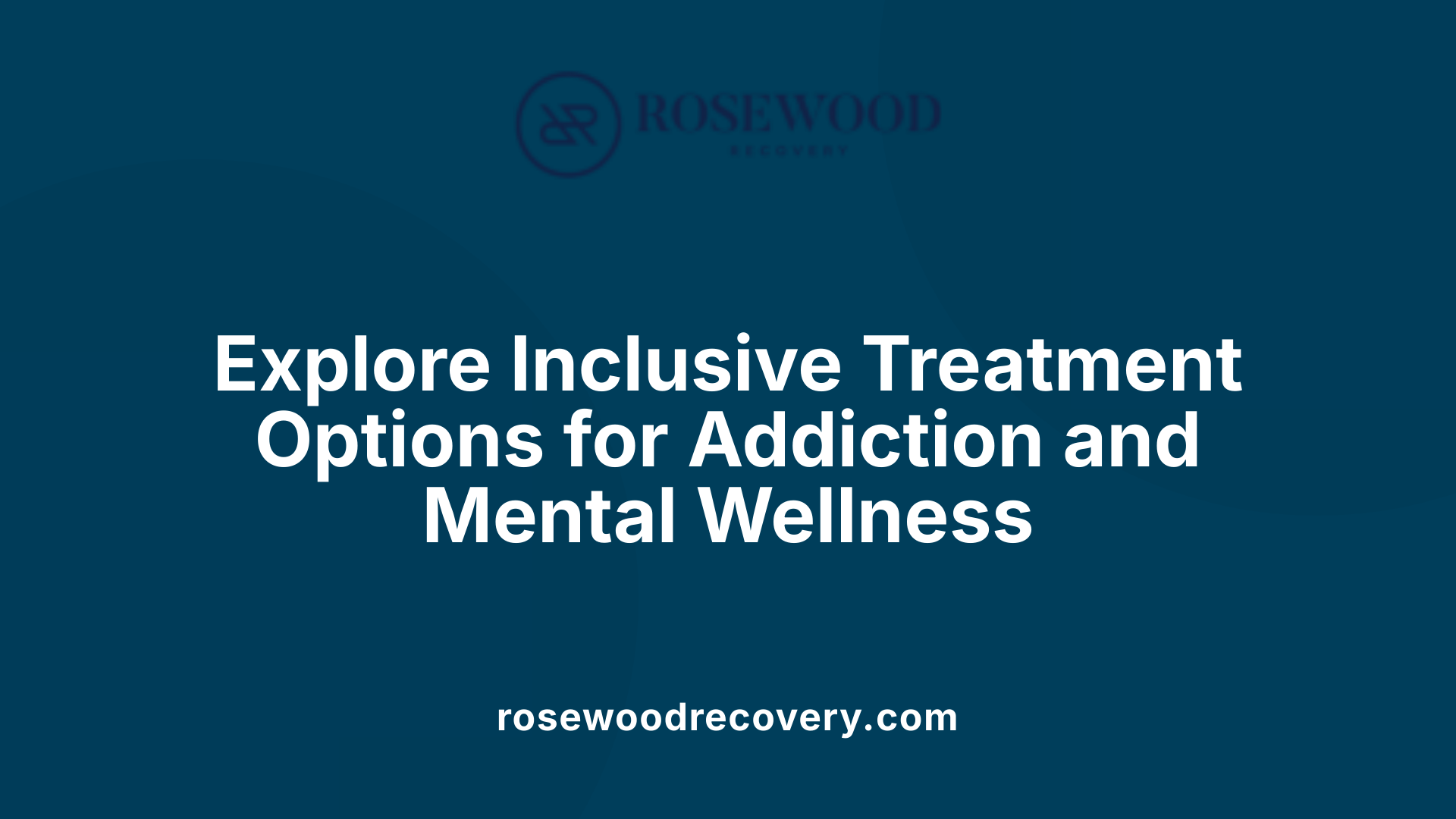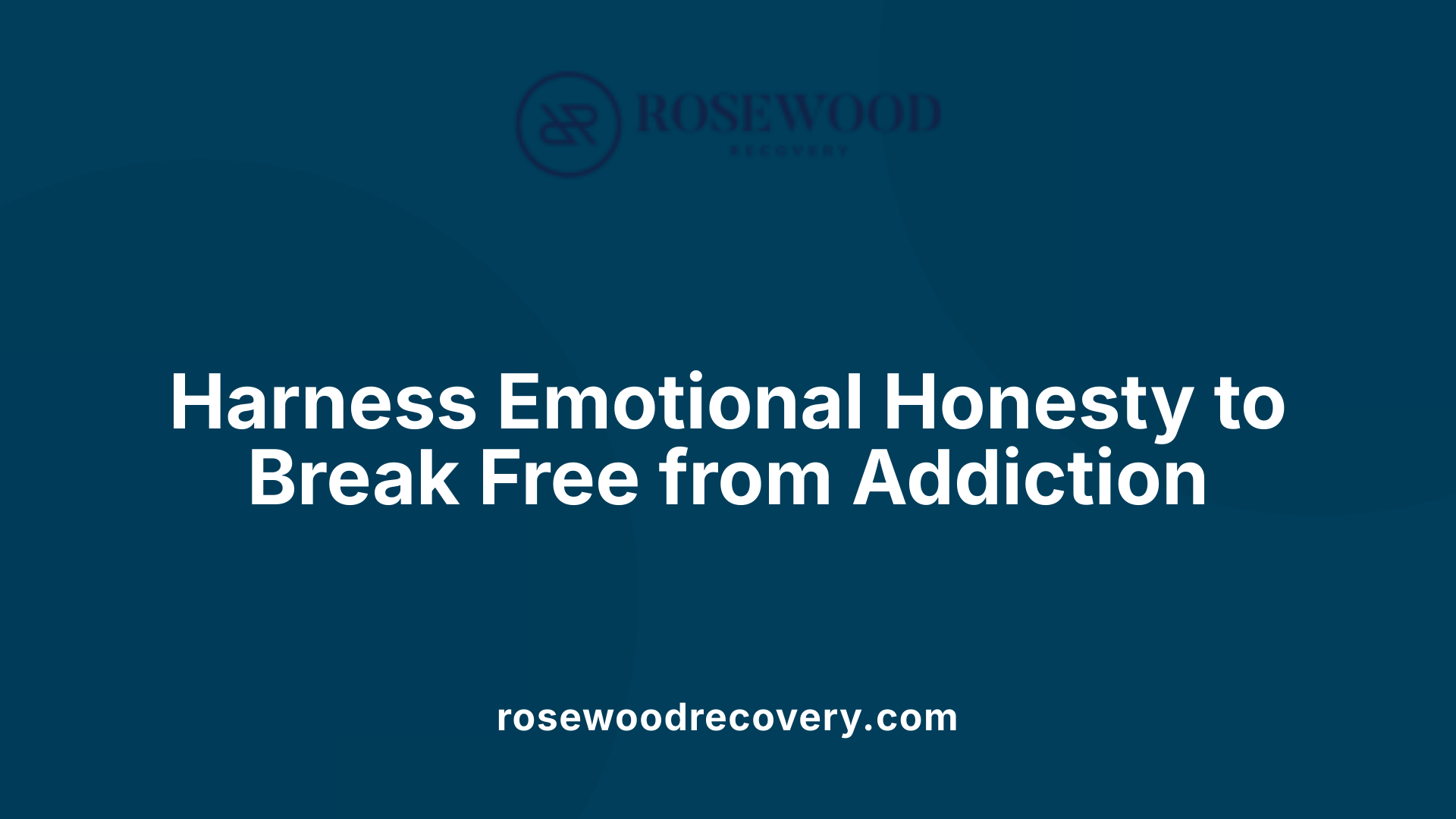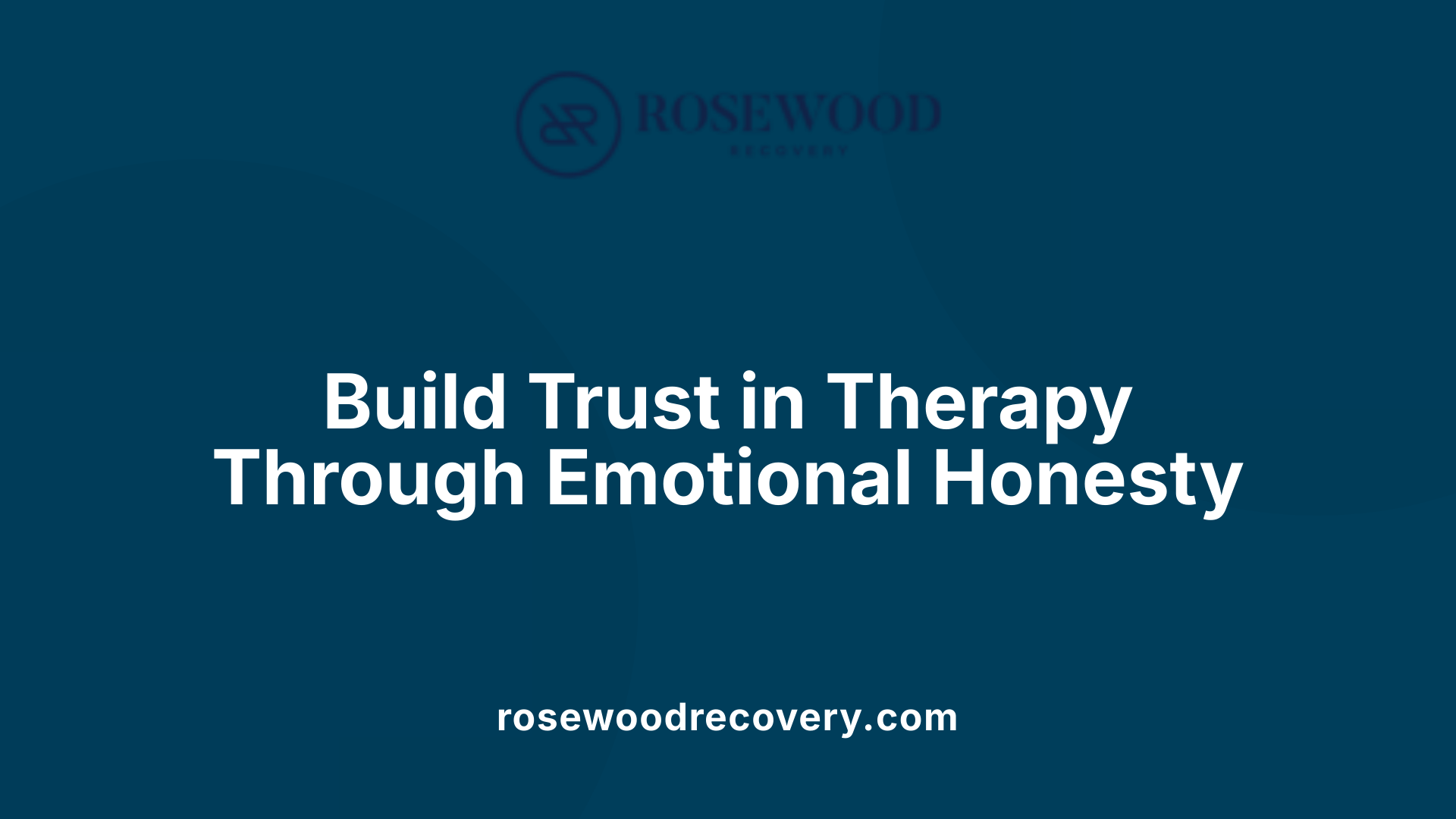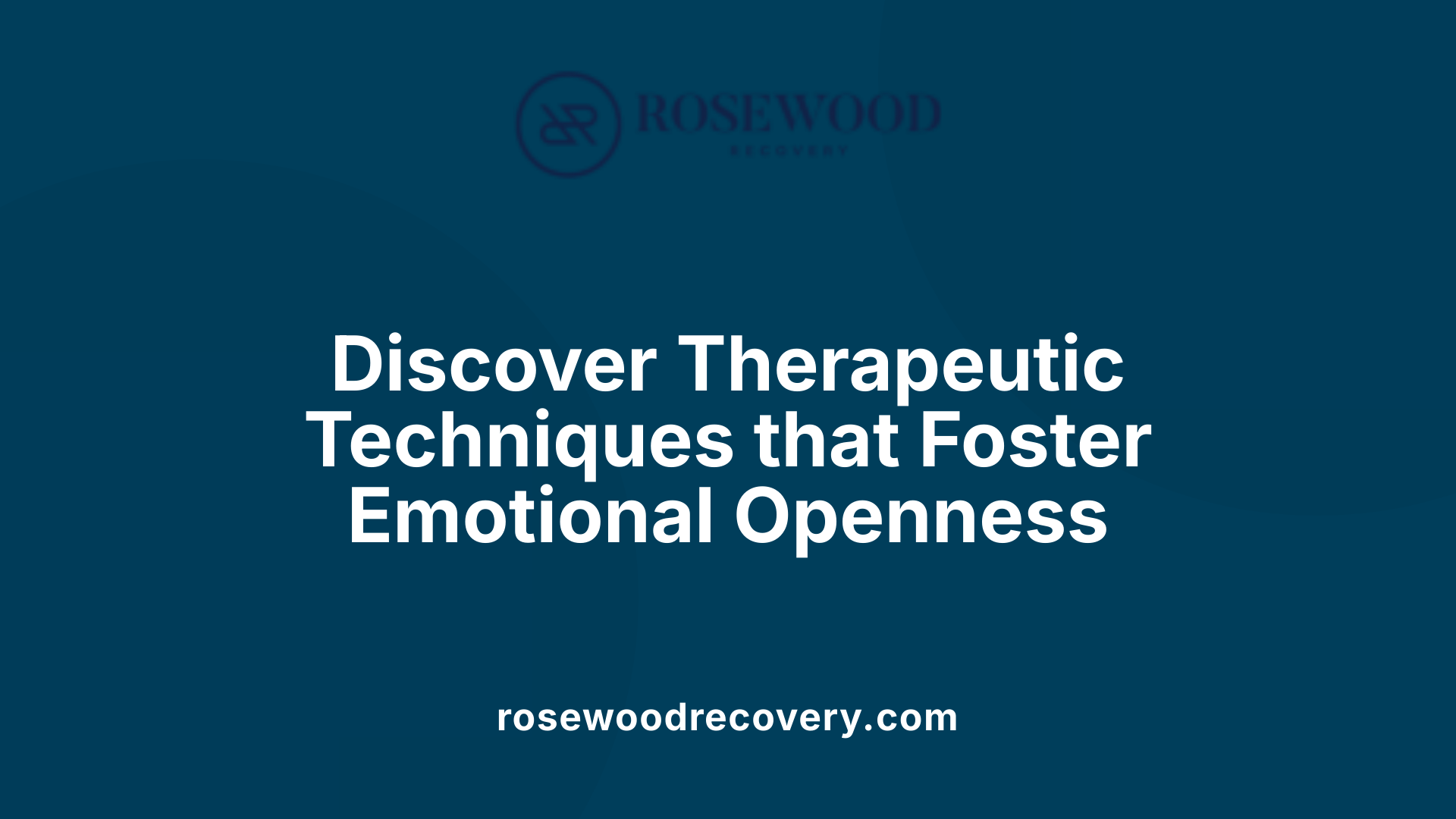Understanding the Role of Emotional Honesty in Addiction Recovery
Emotional honesty is not merely a therapeutic tool; it is the bedrock upon which successful addiction recovery and therapeutic trust are built. In treating substance abuse and co-occurring mental health disorders, emotional openness enables individuals to confront underlying feelings previously masked by addiction. This article explores how emotional honesty fosters trust within therapeutic relationships, underpins effective treatment, and supports sustainable recovery outcomes.
Comprehensive Treatment Services Addressing Addiction and Mental Health

What comprehensive treatment services are available for substance abuse, mental health issues, and various forms of addiction?
Comprehensive treatment for substance abuse and mental health challenges involves a broad range of services designed to address the complex nature of these disorders. Medical detoxification is often the first step, safely managing withdrawal symptoms to prepare individuals for further treatment.
Key Therapies and Medication-Assisted Treatment
Individual and group therapies play a vital role in recovery, helping patients develop coping strategies and emotional honesty. Medication-Assisted Treatment (MAT) combines medications with counseling to effectively manage substance use disorders, reducing cravings and promoting long-term recovery.
Support Systems and Oversight
Treatment programs frequently include services for co-occurring mental health conditions, providing integrated care. Statewide initiatives like Statewide Automated Management (SAMH) support the coordination of services. Oversight by organizations such as the Behavioral Health Ombudsman ensures adherence to quality standards and ethical care.
Accessibility and Resources
Access to these services is enhanced by centralized resources like FindTreatment.gov, which offers confidential, up-to-date information on local treatment facilities. Additionally, free 24/7 helplines—including the 988 Suicide & Crisis Lifeline, SAMHSA Helpline, and Disaster Distress Helpline—provide immediate support and guidance.
Medicare and other insurance often cover a spectrum of inpatient and outpatient services, ranging from crisis interventions to preventive screenings.
Prevention and Systemic Services
Prevention programs targeting youth and systemic supports such as background screening, licensing, and crisis centers form part of an integrated approach tackling both treatment and relapse prevention, ensuring patients receive coordinated and comprehensive care in their path toward recovery.
The Power of Emotional Honesty in Overcoming Addiction

What Role Does Emotional Honesty Play in Confronting Addiction?
Emotional honesty serves as a cornerstone in sustainable addiction recovery by helping individuals confront and process their underlying feelings openly. Since substances like drugs and alcohol are often used to numb emotional pain, acknowledging these emotions honestly allows individuals to address the root causes of their addiction rather than merely suppressing symptoms. This open approach fosters trust and open communication, which are crucial for rebuilding relationships damaged by addiction.
How Does Emotional Honesty Help Break Denial and Avoidance Patterns?
Addiction frequently involves denial and avoidance of painful truths. Many individuals hide or distort facts about their substance use due to fear, shame, or guilt. By practicing emotional honesty, they confront these difficult emotions head-on instead of evading them. Therapies such as Cognitive Behavioral Therapy (CBT) and Dialectical Behavior Therapy (DBT) support this process by helping individuals recognize distorted thinking and regulate intense feelings, respectively. This honest self-reflection promotes healing, personal growth, and the development of healthier coping mechanisms.
What Is the Connection Between Substance Use and Emotional Numbing?
Substances often serve as tools to dull overwhelming emotions like stress, frustration, and loneliness. Emotional honesty counters this numbing by encouraging individuals to identify and express their true feelings rather than bury them under substance use. Addressing these emotions openly reduces the risk of relapse, as unaddressed feelings commonly act as triggers. Therapy programs focus on replacing substance use with honest emotional expression and coping strategies such as mindfulness and group support.
How Does Honest Self-Reflection Empower Recovery?
Honesty during addiction treatment fosters a sense of empowerment by enabling individuals to confront their issues directly and honestly. Maintaining transparency with oneself and others strengthens commitment to sobriety, akin to building a muscle that grows stronger with practice. This empowered state enhances morale by reducing denial, fostering better insight into addiction’s root causes, and supporting long-term recovery goals. Ultimately, emotional honesty equips individuals with the tools needed to navigate recovery confidently and sustain their progress.
How Emotional Honesty Cultivates Therapeutic Trust

Open Communication in Therapy
Emotional honesty paves the way for open communication between individuals in recovery and their therapists. When patients honestly share their feelings, fears, and struggles, it breaks down barriers of secrecy and denial commonly associated with addiction. This openness allows therapists to accurately assess the patient’s needs and tailor interventions accordingly.
Building Empathy and Mutual Respect
Honest expression of emotions fosters empathy and mutual respect within the therapeutic relationship. As patients reveal their true experiences, therapists can connect more deeply, responding with understanding rather than judgment. This dynamic strengthens the alliance and motivates continued engagement in recovery efforts.
Nonjudgmental, Trauma-Informed Environments
Creating a nonjudgmental and trauma-informed therapeutic environment is essential for supporting emotional honesty. Such settings reduce fear of stigma or shame, encouraging patients to safely confront painful emotions or past trauma. This acceptance is crucial in nurturing trust and allowing transformative healing.
Importance of Transparency with Therapists
Transparency and honesty with therapists enable continual evaluation of recovery progress and adherence to treatment plans. Being truthful about setbacks or relapse triggers empowers patients to tackle problems proactively, preventing further harm. In return, therapists can provide appropriate feedback and support, reinforcing a collaborative approach to healing.
Together, emotional honesty and therapeutic trust form the foundation for successful addiction recovery by ensuring a safe space for genuine dialogue, empathy, and ongoing support.
Therapeutic Approaches Supporting Emotional Honesty

How Does Cognitive Behavioral Therapy (CBT) Promote Emotional Honesty?
CBT helps individuals identify and challenge distorted thinking patterns that often mask true feelings. By fostering awareness of these thoughts, clients learn to acknowledge their emotions honestly. This approach encourages healthier thought processes, which supports confronting underlying issues instead of avoiding them through substance use.
What Role Does Dialectical Behavior Therapy (DBT) Play?
DBT focuses on regulating intense emotions and developing mindfulness. It teaches clients how to observe their feelings without judgment and improves interpersonal skills. This increased emotional regulation and mindfulness allow for more transparent emotional expression, essential for breaking the cycle of addiction.
How Does Skills Training for Mindfulness and Emotion Regulation Help?
Mindfulness practices cultivate self-awareness, enabling individuals to recognize emotions as they arise rather than suppressing them. Emotion regulation skills teach practical strategies to manage stress, frustration, and loneliness—common triggers for relapse. These skills create a foundation for emotional honesty by reducing fear and overwhelm.
How Are Healthier Coping Mechanisms Integrated?
Therapy programs incorporate techniques that replace substance use with adaptive coping strategies. This includes developing problem-solving skills, engaging in support groups, and encouraging open communication. By promoting transparency and self-awareness, these mechanisms help sustain long-term recovery and prevent relapse.
| Therapy Approach | Focus Area | How It Supports Emotional Honesty |
|---|---|---|
| Cognitive Behavioral Therapy | Identifying thought distortions | Encourages acknowledgment of true emotions and reframes negative thinking patterns |
| Dialectical Behavior Therapy | Emotion regulation & mindfulness | Enhances ability to express emotions honestly and develop interpersonal skills |
| Skills Training | Mindfulness & emotion management | Builds self-awareness and coping strategies for handling relapse triggers |
| Coping Mechanisms Integration | Healthy alternatives to substance use | Replaces avoidance with honest communication and practical support |
Overcoming Barriers to Emotional Honesty in Therapy

Fear of Judgment and Shame
Many individuals in addiction recovery grapple with fear of judgment and shame, which can hinder emotional honesty. These feelings often stem from past experiences of stigma or self-criticism, making it difficult to open up about vulnerabilities. Recognizing these fears is the first step toward overcoming them.
Guilt and Emotional Overwhelm
Addiction frequently brings guilt over past behaviors, which can intensify emotional overwhelm. This heavy emotional burden may cause individuals to avoid confronting their true feelings, stalling progress in therapy. Addressing these emotions through guided support is crucial.
Role of Supportive Therapeutic Environments
Nonjudgmental and trauma-informed therapy settings play a vital role in helping individuals feel safe expressing their emotions honestly. Trust, empathy, and collaboration between patient and therapist create a foundation where emotional honesty can flourish free from fear and shame.
Developing Self-Awareness and Challenging Negative Thoughts
Therapies such as Cognitive Behavioral Therapy (CBT) encourage patients to develop self-awareness by identifying distorted thinking patterns. Challenging these negative thoughts helps reduce emotional burdens, promotes honesty with oneself, and strengthens coping mechanisms during recovery.
Practicing mindfulness and participating in techniques that foster emotional openness aid individuals in stepping past these barriers. This journey towards emotional honesty empowers patients to engage actively in their recovery and lay a foundation for lasting sobriety.
Emotional Honesty and Relapse Prevention
What Are Common Relapse Triggers Linked to Unaddressed Emotions?
Unaddressed emotions such as stress, frustration, and loneliness frequently act as relapse triggers for individuals recovering from addiction. When these feelings remain suppressed or ignored, they can intensify cravings and lead to a return to substance use as a coping mechanism.
How Does Honest Expression Reduce the Risk of Relapse?
Honest acknowledgment and expression of emotions help individuals process their feelings rather than numbing them with substances. Communicating openly about inner experiences fosters emotional regulation and resilience, which are crucial in avoiding relapse. Therapy approaches like Cognitive Behavioral Therapy (CBT) and Dialectical Behavior Therapy (DBT) support the development of these skills.
Why Is It Important to Avoid the Slippery Slope of Dishonesty?
Dishonesty during recovery—such as lying or hiding information about substance use—can quickly undermine progress. This slippery slope often leads back to addictive behaviors by preventing individuals from confronting problems directly and receiving necessary support. Maintaining honesty builds empowerment and strengthens commitment to sobriety.
How Does Secrecy Indicate Relapse Risk?
Struggling with secrecy around emotions or behavior can signal vulnerability to relapse. Recognizing secrecy is an important step toward recommitting to transparency and honesty, both with oneself and others. This awareness helps in actively choosing healthier coping strategies and seeking support when needed.
In summary, embracing emotional honesty by openly recognizing and expressing feelings plays a vital role in preventing relapse. It interrupts cycles of denial and secrecy, encourages healthier coping skills, and strengthens recovery foundations.
Rebuilding Relationships Through Honesty in Recovery
Restoration of trust with loved ones
Honesty plays a critical role in healing relationships that were damaged by addiction. Transparent communication fosters trust and allows individuals in recovery to make heartfelt apologies, laying the groundwork for rebuilding strong connections with family and friends. Being open about struggles and feelings breaks down walls built by secrecy and denial, offering loved ones reassurance and a clearer understanding of the recovery journey.
Family therapy’s role in improving communication
Family therapy is an essential component of addiction recovery, as it helps restore effective communication within the family unit. Therapy sessions create a safe space where family members can express emotions openly and honestly, facilitating deeper understanding and empathy. This process helps address misunderstandings or resentment caused by the addiction, improving relationships and promoting collaborative support for long-term sobriety.
Addressing trauma and dysfunctional family dynamics
Addiction often stems from or worsens existing traumas and dysfunctional family patterns. Family therapy interventions target these underlying issues by identifying unhealthy behaviors and emotional wounds that contribute to substance abuse. This therapeutic approach empowers families to confront and heal from past trauma together, fostering healthier dynamics that support recovery.
Supporting accountability and healthy boundaries
Family therapy also emphasizes the importance of accountability and setting healthy boundaries. Educating family members about addiction’s impact encourages them to avoid enabling behaviors and instead promote responsibility and mutual respect. Clear boundaries help prevent relapse triggers and ensure that the family environment contributes positively to maintaining sobriety and emotional well-being.
The Therapeutic Relationship: Cornerstone of Successful Treatment
Trust, empathy, and collaboration between patients and staff
A strong therapeutic relationship is fundamental to successful addiction treatment. Patients often feel vulnerable and challenged by their recovery journey. When staff members demonstrate empathy and foster trust, patients are more likely to engage openly. Collaboration between patients and staff creates a supportive environment, encouraging honest communication and mutual respect. This foundation helps patients feel safe to confront their addiction and underlying emotions.
Cultural competence and ethical boundaries
Effective therapeutic relationships require awareness of cultural differences and strict adherence to ethical boundaries. Cultural competence ensures that care is respectful and relevant to each patient's unique background, which enhances trust and reduces misunderstandings. Ethical boundaries maintain professionalism and safety within the relationship, preventing harm and preserving patient dignity. Together, these components strengthen the therapeutic alliance.
Patient engagement and adherence to treatment plans
A positive bond between patients and staff directly promotes higher engagement in treatment. When patients trust their providers, they are more cooperative, motivated, and willing to follow treatment plans. This increases the likelihood of sustained behavioral changes and reduces dropout rates. In substance abuse treatment, staff attitudes that are nonjudgmental and trauma-informed further enhance patient retention and foster long-term recovery.
Therapeutic rapport influencing recovery outcomes
Research consistently shows that a strong therapeutic alliance is one of the best predictors of positive outcomes in mental health and addiction care. The trust, empathy, and collaboration that make up this rapport facilitate behavioral change and improve overall treatment effectiveness. Patients feel valued and understood, which bolsters their self-esteem and optimism for the future. This rapport also supports more effective communication, enabling better monitoring of progress and timely adjustments to treatment strategies.
Practical Strategies to Foster Emotional Honesty
Mindfulness and Self-Awareness Practices
Mindfulness encourages paying attention to the present moment without judgment, which helps individuals recognize and accept their true emotions. Self-awareness allows one to identify feelings that may have been hidden or numbed by substance use. Together, these practices promote emotional honesty by enabling individuals to confront their emotions openly and honestly.
Open Communication Methods such as Journaling and Artistic Expression
Expressing emotions through journaling or artistic activities provides a safe outlet for processing feelings. These methods encourage honesty by making it easier to explore and articulate emotions that might be difficult to say aloud. Sharing written or creative work in therapy sessions can further deepen emotional understanding and communication.
Participation in Support Groups like SMART Recovery
Support groups offer a community of individuals committed to sobriety and honest self-examination. Programs like SMART Recovery incorporate tools, such as worksheets for identifying and living by core values, which empower participants to maintain honesty with themselves and others. The shared experiences in these groups reinforce the importance of emotional honesty in recovery.
Using Core Values to Guide Honest Living
Knowing and embracing personal core values helps individuals create a strong foundation for honest living. By consistently reflecting on these values, people in recovery align their actions and decisions with their true selves, reducing the tendency toward denial or avoidance. This alignment fosters transparency and supports sustained sobriety.
Incorporating these strategies builds emotional honesty gradually, strengthening one's ability to face feelings openly and honestly, which is vital for long-term recovery success.
The Role of Support Networks and Post-Treatment Planning
Including Family and Friends in Recovery
Building and maintaining supportive relationships with family and friends during and after addiction treatment is often challenging but essential. Involving loved ones in therapy sessions, such as family therapy, helps rebuild trust and improve communication damaged by addiction. Family therapy addresses underlying issues like trauma and dysfunctional patterns that can contribute to substance abuse. It also encourages accountability and fosters healthy boundaries to prevent enabling behaviors.
Developing Coping Strategies for Stress, Anxiety, and Trauma
Effective coping skills are vital components of recovery, especially for managing stress, trauma, anxiety, and depression. These strategies are typically developed through group and individual therapy sessions. Learning to handle emotional challenges strengthens resilience and reduces the risk of relapse after discharge. Techniques often include mindfulness, emotional regulation, and peer support.
Life Skills Training for Independent Living
Transitioning to independent living after inpatient treatment requires practical life skills. Programs often emphasize establishing daily routines, seeking employment, and managing personal finances. These skills help individuals adjust to life outside treatment facilities and maintain sobriety by providing structure and stability.
Importance of Ongoing Support and Communication
Sustaining long-term recovery relies heavily on ongoing support and open communication, both within the family and through support networks. Continued emotional backing and guidance help resolve conflicts and prevent relapse. Therapy and support groups provide environments where individuals can openly express feelings, practice honesty, and maintain motivation for sobriety. A coherent, personalized approach involving families and support systems improves treatment outcomes and overall well-being.
Building Resilience Through Honesty and Therapeutic Trust
Honesty as a Skill to Be Strengthened
Emotional honesty in addiction recovery is not just an innate trait but a skill that can be cultivated over time. Practicing honesty regularly helps individuals build strength in this area, much like exercising a muscle. This ongoing practice promotes empowerment by encouraging people to confront their feelings directly rather than succumbing to denial or secrecy, which can trigger relapse.
Boosting Self-Esteem and Optimism
Developing self-esteem and an optimistic outlook is essential for sustained recovery. Positive, respectful relationships within therapeutic settings foster trust and convey a sense of being valued. These supportive bonds help individuals overcome feelings of shame and guilt—barriers that often inhibit honest self-expression—and nurture hope for a healthier future.
Transparency Facilitating Recovery Progress Evaluation
Being transparent with oneself and others allows individuals to more accurately assess their recovery journey. Open communication provides clarity about challenges and achievements, enabling adjustments to treatment plans when necessary. This transparency keeps individuals engaged and accountable, reducing the likelihood of slipping back into old addictive behaviors.
Fostering a Positive Identity and Sustained Sobriety
Honest interactions with therapists, peers, and family members contribute to building a positive identity rooted in authenticity. Such trustful relationships inspire commitment to sobriety by reinforcing the individual’s sense of responsibility and connection. In this way, emotional honesty acts as a foundation for long-term recovery success and resilience.
Emotional Honesty: The Keystone of Lasting Therapeutic Trust and Recovery
Sustainable recovery from addiction and co-occurring mental health challenges hinges on emotional honesty as a fundamental principle. It enables individuals to dismantle denial, confront deeply held feelings, and embrace the healing process with transparency and courage. Therapeutic trust emerges from this openness, nurtured by skilled professionals providing empathetic, nonjudgmental care. Combined with comprehensive treatment services and robust support networks, emotional honesty empowers individuals to rebuild relationships, develop resilience, and maintain long-term sobriety. Ultimately, fostering emotional honesty within therapy is not just a practice but the keystone to authentic recovery and renewed lives.
References
- The Power of Emotional Honesty in Addiction Recovery
- Psychotherapy and Therapeutic Relationship - StatPearls - NCBI
- The Importance of Being Honest During Addiction Treatment
- A qualitative study of patients' reflections on inpatient SUD ...
- Healing Together: The Role of Family Therapy in Addiction ...
- Emotional Honesty in Recovery - TruHealing Centers
- Substance Abuse and Mental Health
- FindTreatment.gov: Home
- Mental health & substance use disorders




